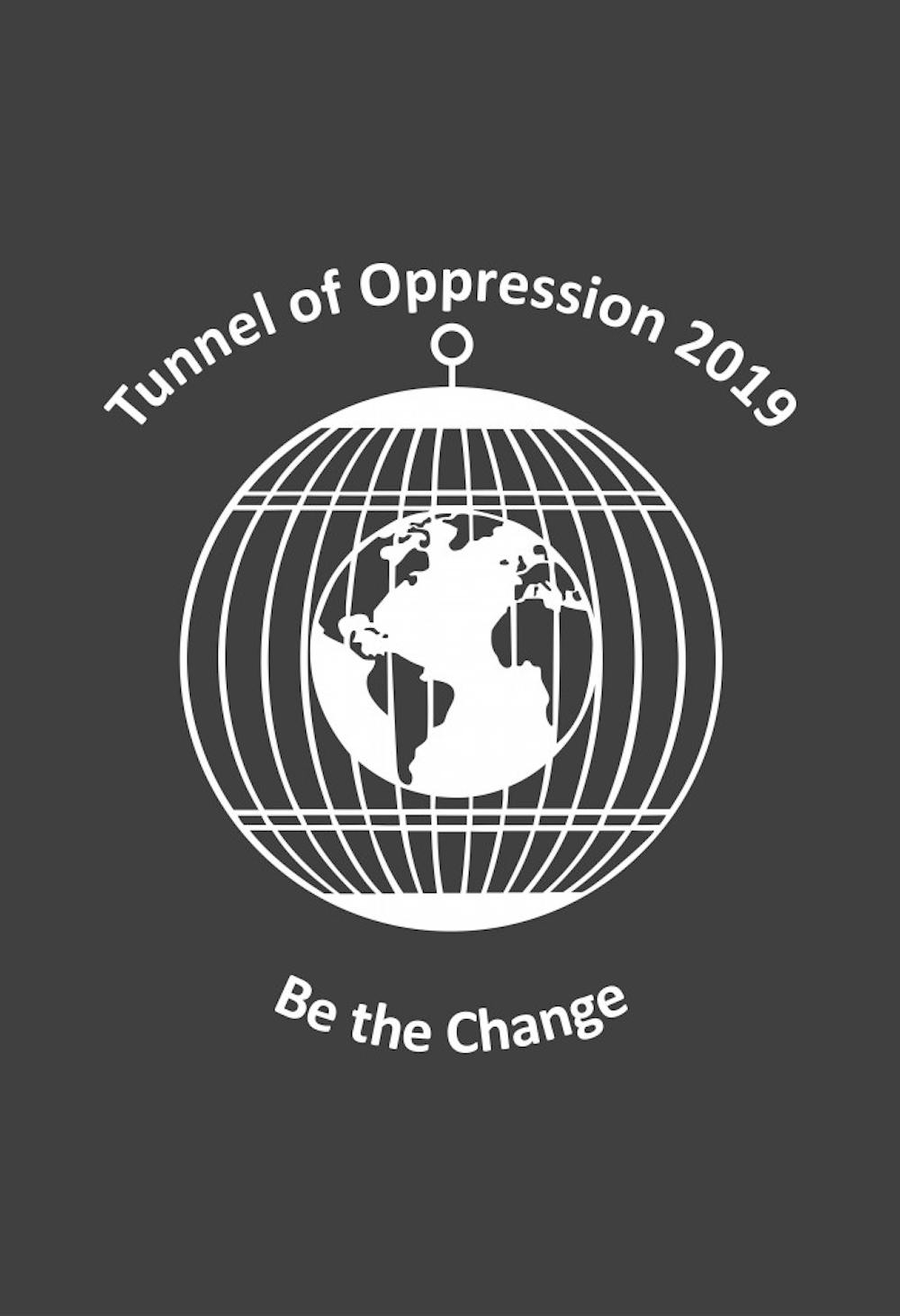A young teen sits uncomfortably at a table in a coffee shop, squirming as her parents ask her about her date for the Sadie Hawkins dance. Unwillingly, the teen informs her parents that she is gay.
They are not supportive.
“You’re going to need help, you’re going to get help and you’re going to thank us later,” shouted the father figure.
This is what students and Muncie community members got a glimpse of as they ventured through the Tunnel of Oppression Thursday evening, hosted by Housing and Residence Life in the L.A. Pittenger Student Center Ballroom. The scenario is fictional, and is intended to show an audience the kinds of discrimination that oppressed groups face.
Drew Leininger, a member of the Tunnel of Oppression subcommittee in Housing and Residence Life, said that it hosts this event annually to educate attendees about the common forms of discrimination oppressed groups of people face everyday.
“The goal of the tunnel is to show students who don’t identify with these groups what students are going through,” Leininger said. “It’s a way to educate students on different identities and the different experiences of these identities.”
Attendees gathered at the Student Center Ballroom, where they ventured through red and black curtains to witness four five-minute scenarios put on by different student organizations.
The whole tour lasted about 45 minutes and included briefing and debriefing sessions.
First, Spectrum members showcased the kinds of discrimination members of the LGBTQ community experience when they “come out” as LGBTQ.
The actors portrayed a high school student coming out to her parents as gay at a coffee shop. The parents disapprove.
Second, the Black Student Association (BSA) members delivered a message focused on “implicit bias” –– unintentional or unconscious racism one displays toward a person of color, often based off stereotypes.
BSA members created a classroom scenario, where a black student enters the class late. The student came into class late because his mother was in the hospital, but the teacher refuses to listen to his explanation, disregarding it as “another excuse.”
Additionally, the student mispronounces vocabulary terms on the whiteboard, which prompts the teacher to insult his intelligence rather than teach him the correct manner to say the words.
Third, Step In. Speak up. performed a scenario that detailed the emotions a sexual assault victim deals with after the assault.
In the scene, a female college student is sexually assaulted and the next day she tries to get help from her roommate and her mom. But both these characters blame her instead of showing her support.
The scene also touches on the subject of consent.
“This scene shows that the torment of assault doesn’t stop after assault,” said Jenna Risacher, the vice president for Step In, Speak Up, and the actor playing the sexual assault victim in the scene.
In the last scenario, The Center for Peace and Conflict Studies exhibited a situation in which intentionally racist characters verbally harass two Muslim women, telling them to get out of “their country.”
The racist characters force the women to either join them as oppressive people and give up their identities as Muslim, or to leave. One woman joins, holding up a white mask that completely covers her face, and the other woman rushes away from the harassers.
The Tunnel of Oppression ended with a debrief, in which attendees expressed feelings of discomfort, sadness, emotional distress and surprise at how common these forms of discrimination occur.
Steve Robert, a Muncie resident, said a good way to be supportive of oppressed groups is to ask them if they are okay and just listen to what they have to say.
“Somebody ends up getting hurt badly, so just get with them and say, ‘Hey,’” Robert said.
Junior biology major Jayla Thompson acted as a tour guide a second time this year because she said it’s a powerful event.
“[Attendees are] really shocked –– like they’ve never experienced that before, and it’s a good sign,” Thompson said. “It shows that they are grasping the feelings that the facilitators want them to be provoked by. They can take these reactions and form actions upon them to reduce oppression.”
Housing and Residence Life also handed out T-shirts at the event. The shirts are gray, depict the world in a bird cage and say “Tunnel of Oppression 2019” at the top of the bird cage, and “Be the Change” below the bird cage.
Contact Hannah Gunnell with comments hrgunnell@bsu.edu or on Twitter @hagunnellNEWS.





